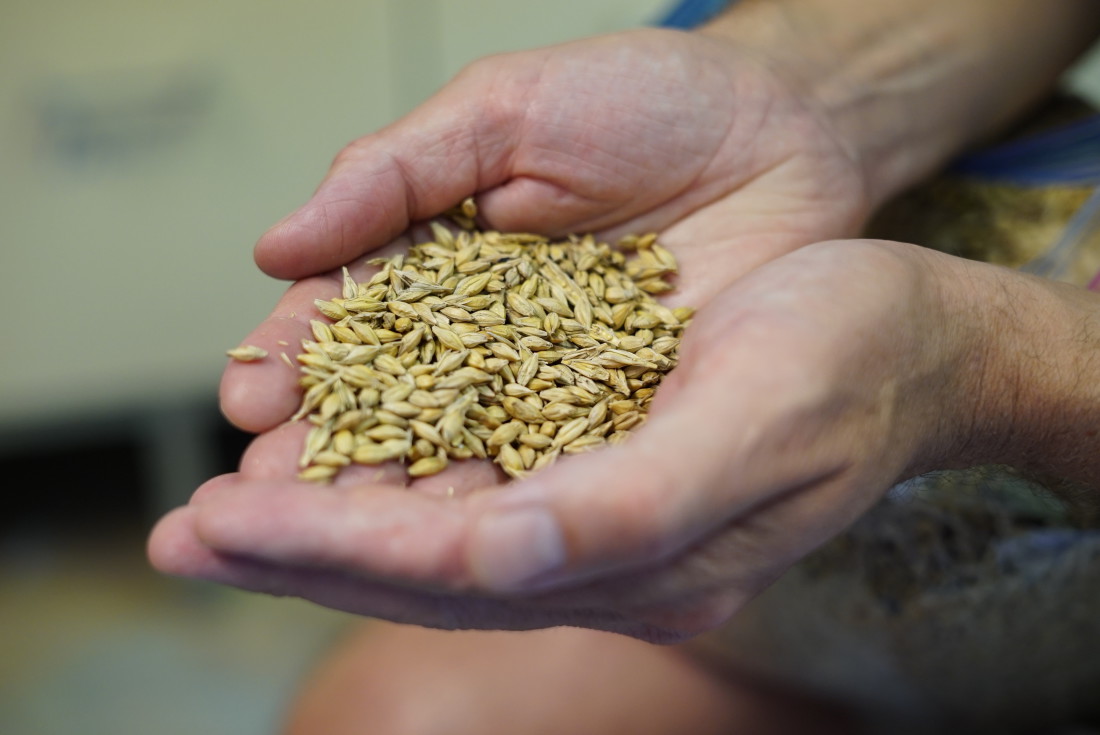Asheville’s craft brewing community has long prided itself on using locally sourced ingredients, and a major component of those beers may soon become much more local thanks to a collaborative partnership between Riverbend Malt House and the Biltmore Estate. With the help of Riverbend, Biltmore planted a 10-acre test plot of barley on the estate’s farmland in October. After a successful harvest in June, that grain is being malted at Riverbend before finding its way into Biltmore Beer Co.’s Cedric’s line of beers, which Riverbend recently helped to redesign.
“It began as a roundtable discussion around expanding the agricultural operations at the estate, and we were able to step in and provide some information on the current state of play in growing small grains in North Carolina and what it means to grow high-quality small grains for the malting industry,” explains Riverbend co-founder Brent Manning.
“Bill Cecil and the management team at Biltmore are really interested in the estate continuing to be a working farm,” says Riverbend CEO Scott Hickman. “And they’re always on the hunt for additional opportunities — whether that’s livestock or that’s agricultural — to have it continue to be a functional farm and, best case, to tie that right back into what their guests are consuming.”
While all of the grain produced in this year’s harvest will go to making the retooled versions of Cedric’s Pale Ale and Brown Ale, the success of this trial will almost certainly result in the availability of Biltmore-grown grains to local brewers in subsequent years. According to Biltmore Wine Co. President Jerry Douglas, who also oversees the company’s beer production, the expected expansion of acreage dedicated to barley and brewing-related specialty grains for the upcoming year will be determined in advance of the fall planting cycle by market demand and interest on the part of local breweries for grains both grown and malted in Asheville.
This limited experimental run, cultivated by Ted Katsigianis, Biltmore vice president of agriculture and environmental science, was intended to test the viability of growing specific strains of high-quality barley appropriate for the brewing industry. This included two-row, a variety of barley favored by brewers for its lower protein content and increased availability of fermentable sugars compared with six-row, which is more easily grown in the Southeast and commonly used for livestock feed.
“Of the 10 acres planted, 5 were two-row,” says Hickman. “There’s a popular belief that you can’t grow two-row in the South, but that’s not the case. Stay tuned, because I think you’ll see more come of that.”
The strain of two-row selected by Riverbend for the Biltmore trial, known as “Violetta,” was developed by French seed company Limagrain Cereal Seeds as a winter two-row malting strain designed with a resistance to premature germination damage and diseases common to the East Coast. According to Manning, lab tests on the estate-grown Violetta have been impressive despite a late frost/freeze and substantial rain at harvest time.
Riverbend’s involvement in updating Biltmore Beer Co.’s products, a traditional English pale ale and brown ale that have used the same recipe since their introduction in 2010, grew out of the barley experiment. Available exclusively on the estate, Cedric’s Brown and Cedric’s Pale are brewed in space leased by the company at Highland Brewing Co.’s production facility, and Highland brewmaster Hollie Stephenson was extensively engaged in crafting revised recipes for the beers in collaboration with Manning and the Riverbend team.
“A lot of brewers end up inadvertently collaborating with us, building beers around the flavors our malt offers that are distinct from what’s available on the rest of the market,” says Riverbend co-founder Brian Simpson. “With Biltmore trying to tie the agricultural expansion in, it was a good opportunity for us to take a more active advisory role in refreshing the Cedric’s recipes to reflect the changing beer market and also showcase the estate grain while having a good story to tell about the agriculture down the line.”
The successful efforts of Riverbend and Biltmore to grow high-quality, maltable grain in Asheville will pay dividends to the local beer community in a number of ways, and the approximately 15-mile round trip the barley used in Cedric’s will take from farm to consumer is a perfect case in point. In addition to providing brewers with a truly local source for one of the four primary ingredients of beer, the proximity of the barley’s origin to Asheville breweries will drastically reduce both the cost of shipping grain and the environmental impact inherent to that process.
“Think about the local aspect of this story,” says Hickman. “The grain for Cedric’s will now be grown 4 miles from Riverbend, then it comes here to be malted, goes another few miles to Highland, where it’s brewed, and then goes right back to the estate. You can’t get much more local than that.”
Editor’s note: Jerry Douglas is the father of Beer Scout reporter Scott Douglas.




Fantastic article. Well sourced and informative. Scott Douglas is a standout commentator on the Asheville beer scene.
Completely undue praise, but thank you nonetheless. The prospect of two-row malt local to Asheville could be a major game-changer for area production breweries, so I hope everyone’s as excited about that potential as I am…